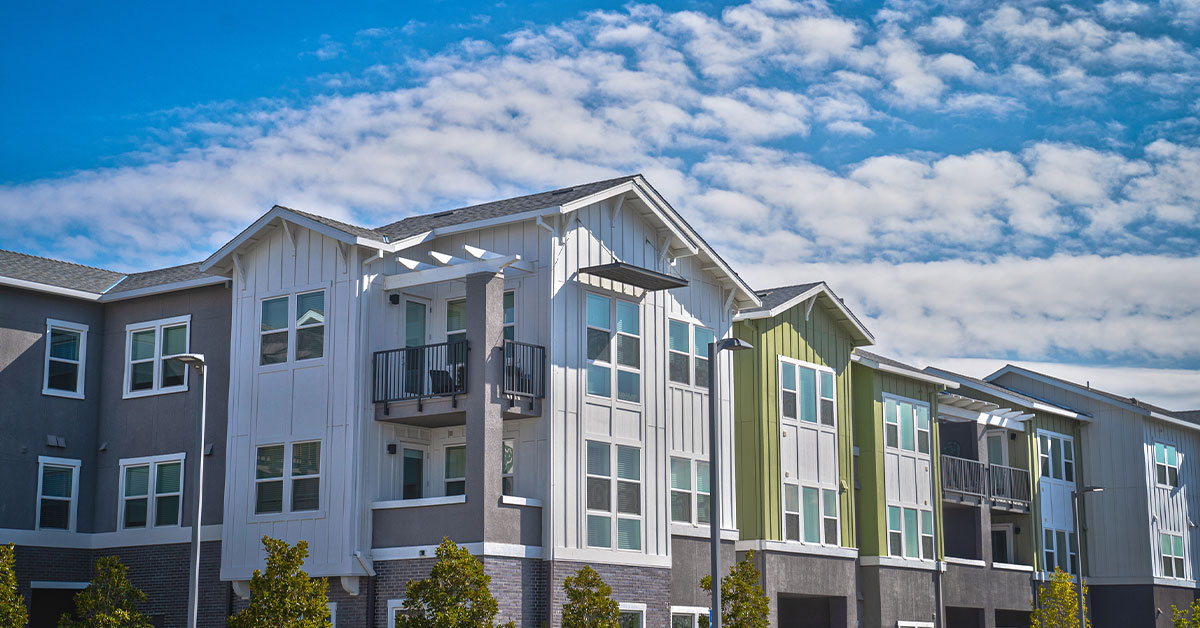When you purchase a condominium, your mortgage lender will require you to buy condo insurance (HO6) to protect the investment. Much like your standard homeowners insurance policy, condo insurance protects your personal property, interior damage, and injury-related claims against you. Although they may sound similar, a few key differences exist between a standard condo insurance policy and a homeowners insurance policy. If you’re in the market for a condo, here’s what you need to know about condo insurance.
Key Takeaways:
- Unlike traditional homeowners insurance, a condo insurance policy does not typically cover the structural complex that your unit is a part of.
- The amount of dwelling coverage you will need to purchase will depend on the type of master policy your association carries.
- If you rent a condo, you do not need to carry condo insurance. However, you should consider having a renters insurance policy.
What Is Condo Insurance and What Does it Cover?

Insuring a condo is different than insuring a home. One of the key differences between the two coverages is what exactly is covered. Unlike homeowners insurance, HO6 condo insurance will not typically cover the structural complex that your unit is a part of. Instead, your condo insurance policy will only cover what is inside your unit or from your “walls in,” and your building’s master insurance policy will cover all common areas and the building’s exterior. Here’s a breakdown of what a standard condo insurance policy covers.
Condo Insurance Coverage
| Coverage Type | What it Covers |
| Dwelling/Building Property Coverage | Dwelling coverage will pay to repair or replace what is inside your unit from the walls if it suffers damage from a covered peril up to your policy’s limits. It’s essential to read your building’s master insurance policy to understand how much dwelling coverage you need, as some policies may provide some coverage for anything that isn’t your personal property. |
| Personal Property Coverage | Personal property coverage will pay to repair or replace your belongings inside your unit up to your policy’s limits. Any belongings not attached to your condo are considered personal property, including furniture, electronics, clothing, and other goods. If these items are damaged or stolen, your policy could help reimburse you for the loss. |
| Liability Coverage | Condo insurance policies also include personal liability coverage. For example, if someone trips inside your condo and injures themselves, your liability coverage can help pay for their medical bills up to your policy’s limits. |
| Loss of Use | Loss of use coverage will pay for any additional living expenses you must cover if you’re suddenly forced to move out of your condo while your unit is repaired due to a covered accident. This can include hotel rates and food expenses up to the policy’s limits. |
| Loss Assessment Coverage | This optional coverage will provide financial aid if the unit owners in your building are financially responsible for a shared loss caused by a covered peril. For example, suppose a fire damages a common area of your building and costs more than what your condo association has set aside. In that case, this coverage will help cover your share which all unit owners must contribute. |
Condo Insurance Covered Perils
As mentioned, your condo insurance will only help cover repairs or replacements if a covered peril damages your unit. Typical covered perils can include:
- Fire or lightning incidents
- Damage from windstorms and hail
- Theft or vandalism
- Explosions
- Busted pipes
What Standard Condo Insurance Does Not Cover
Although condo insurance can cover a variety of perils, there are some situations where you will need more financial assistance to repair or replace items in your unit. These situations typically do not have coverage on a condo policy:
- Earthquakes
- Floods from heavy rain or storms
- Wear and tear
- Sewer backups
What Does Your Condo’s Association or HOA Master Insurance Policy Cover?

As stated, your building’s association or HOA also carries a master insurance policy that provides coverage for your building’s external structure and common areas. These can include the building’s roof, hallways, swimming pools, and elevators. Master policies also provide liability coverage in these common areas. Your condo fees usually go toward your association’s master insurance policy.
The amount of dwelling coverage you will need to purchase will depend on the type of master policy your association carries. If your association’s master policy includes coverage for what’s inside your unit, you may not need to purchase much dwelling coverage. Here’s a rundown of the three central types of policies condo associations typically carry:
Bare Walls Coverage
A bare walls policy will cover all shared areas of your building and its overall structure. It can also cover any property the condo association owns and provides liability coverage for injuries in common areas. This is typically the lowest form of a master policy and does not provide any coverage for a unit’s interior. If your condo association has a bare walls policy, you’ll need to purchase sufficient dwelling coverage to replace what is inside your unit.
Single entity coverage
A single entity policy will cover the building’s structure and common areas and provide liability coverage for injuries in common areas, but it will also cover the built-in interior structures of your condo, such as your floors, walls, fixtures, and cabinets from when the unit was initially built. Although this policy type will cover the built-in interior of your home, it will not cover your personal property inside the unit nor any alterations you make.
All-in coverage
An all-in coverage policy will cover everything included in a bare wall and single entity policy, plus any alterations or improvements you make inside the unit. If your condo association carries an all-in policy, you likely won’t need to purchase any dwelling coverage for your personal policy.
Do I Need Condo Insurance if I Rent a Condo?

If you rent a condo, you will not need to purchase a condo insurance policy. Your landlord should have a condo insurance policy covering repairs to your unit after a covered peril. However, their policy will not cover your personal property inside the rental. To protect your property when renting, you’ll need to purchase a renters insurance policy. A renters insurance policy covers your belongings inside the unit and provides liability coverage if someone is hurt inside the unit, up to your policy’s limits.
Speak With an Insurance Specialist
Whenever you purchase a home or condo, it’s vital that you understand the amount of coverage you’ll need to repair or rebuild your home after a covered accident. As mentioned, there are similarities between a standard homeowners policy and an HO6 condo insurance policy. However, the critical difference is that a condo policy does not cover the exterior of your unit like a homeowners policy does. If you still have questions regarding how much coverage you need, our insurance specialists can help. Give us a call today at (888) 772-4247 to speak with a specialist, or click here to start your quote online.
The information in this article is obtained from various sources and offered for educational purposes only. Furthermore, it should not replace the advice of a qualified professional. The definitions, terms, and coverage in a given policy may be different than those suggested here. No warranty or appropriateness for a specific purpose is expressed or implied.


